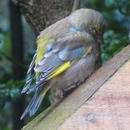Trichomonosis jumps species from pigeons to British finches: Loss of 1.5 million

An epidemic that led to the loss of around 1.5 million garden-visiting finches began when the disease jumped between species, according to a study published by The Institute of Zoology.
Trichomonosis, typically found in pigeons and doves in the UK was first recognized as a new infectious disease in British finches in 2005.
The paper states that, because of Finch trichomonosis, the breeding greenfinch population in Great Britain declined from around 4.3 million to around 2.8 million birds and the average number of greenfinches visiting gardens has declined by 50 per cent.
After spreading across the British Isles, Finch trichomonosis has now been found in continental Europe, where it was first seen in 2008. Migrating chaffinches carrying the parasite from Britain are thought to be the most likely cause of this spread.
While greenfinches and chaffinches are the species that have been most frequently affected, many other garden bird species, including house sparrows, are susceptible to the condition.
Signs of Trichomonosis include general illness, for example lethargy and fluffed-up plumage, drooling saliva, regurgitating food, difficulty in swallowing or laboured breathing. Finches are frequently seen to have matted wet plumage around the face and beak. The disease may progress over several days or possibly weeks, consequently affected birds have often lost a lot of weight.
Diagnosis of trichomonosis in wild birds relies on a post mortem examination. If you wish to report finding dead garden birds, or signs of disease in garden birds, please call the Garden Bird Health initiative on 020 7449 6685.
More information: rstb.royalsocietypublishing.or … sease_invasion.xhtml
Provided by Zoological Society of London

















